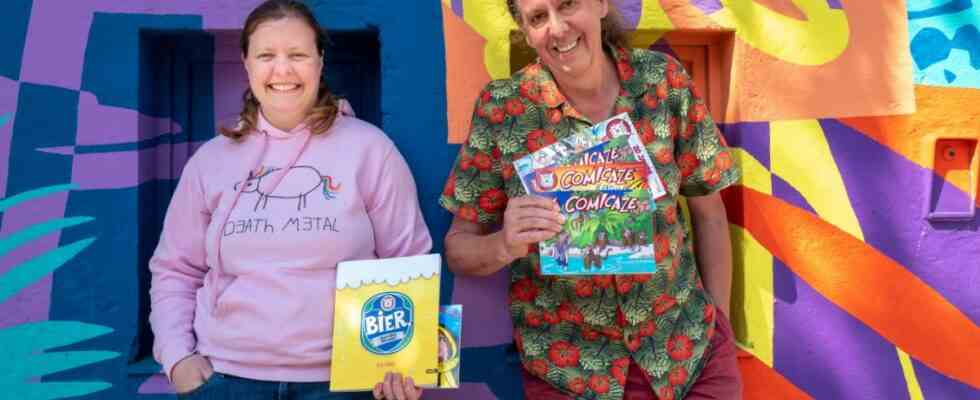This Saturday, May 14th, the Free Comic Day will be celebrated nationwide, and the Gräfelfing municipal library will be taking part. Up to three comic books can be picked up free of charge from the library on this day, and you can choose between 35 books. Including manga, graphic novels and classic superhero comics. As an accompanying event, the comic works of the sixth and seventh graders of the Kurt-Huber-Gymnasium will be exhibited and superheroes will be made from ironing beads with the younger visitors. Members of the Munich hands-on association Comicaze will draw for visitors in the Gräfelfingen library, answer questions about illustrating and drawing comics and put out the association’s own magazines, which can be taken away free of charge in addition to the three free booklets. Anna Spies is the first chairman of the association, Christoph Schöne co-founded it 25 years ago. The motto: support young talents, network them and offer them the opportunity to try things out. Both are longtime illustrators and comic artists. In an interview, they talk about the literary significance of comics.
SZ: In the comic scene you come across different terms, such as cartoon, graphic novel, manga. Does all of this fall under the umbrella of “comic” or does it need to be differentiated?
Spies: Basically, all of this can be subsumed under the term “comic”. As Scott McCloud defined it, “Once two images are side by side that tell a story, it’s a comic.” But it’s also a gray area, because at what point does it become a graphic novel, how big does a character’s eyes have to be for it to be considered manga? And like a graphic novel, superhero comics can also be extremely profound. The comic draws inspiration from all genres.
What do you think of the prejudice that comics are purely a children’s medium?
Spies: That is a very big prejudice. Because even if there are usually beautiful colorful pictures in the comics, you have to take a closer look at these pictures and deal with them. The famous comic “Mouse” is the best example of this, it’s just not for children. You can choose the intellectuality of a comic yourself.
How has the public perception of comics changed over the last few decades?
Lovely: What has changed – but that’s generally the case in the cultural scene – is: I think the whole world is becoming a bit more irrelevant and less humorous. When it comes to humor, it’s inevitable that you laugh at someone. And the thinner people get, the harder it is to come up with humor. “Cancel Culture” is all I say. I think you have a sense of humor when you can laugh at yourself. If everyone feels that they have been stepped on and if no one can reflect on whether one has overshot the target, I think that’s a great pity.
Do you think comics count as literature?
Lovely: Definitely yes. After all, literature is a broad field. It can be children’s books, it can be thick Russian rinds. Max and Moritz by Wilhelm Busch, for example, is one of the first comics. And the highly acclaimed Loriot was also a comic artist in my opinion, although he lacks the speech bubbles. As soon as there are speech bubbles, for some people it is a comic and therefore something inferior, with Loriot it is art. What’s also interesting about comics is that they stand between two art forms. Between literature and film. You read a comic, but you also look at the pictures. This is perhaps also the reason why comics are often regarded as an intermediate form.
The free comic day in the Gräfelfing community library takes place during the regular opening hours from 11 a.m. to 2.30 p.m. The titles that are available for free collection can be found below www.gratiscomictag.de see.

